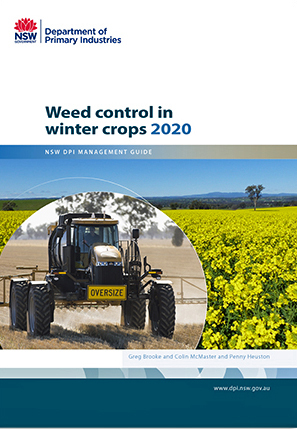
Farmers can get the latest information on effective weed control that is vital for successful and profitable crop production in the free 2020 Weed control in winter crops management guide published by the NSW Department of Primary Industries (DPI).
Weeds lower crop yields by competing for soil moisture, nutrients, light and can carry diseases that affect crops. This competition reduces grain yield and quality and can impede harvesting.
NSW DPI R&D Agronomist Greg Brooke said with many areas receiving good rainfall the winter crop planting season is well underway.
“In the central west it is the best start that many can remember. After three years of drought and no crop, for many it’s worth checking off on some of the basics again,” Mr Brooke said.
“The Weed control in winter crops guide provides important information on the new products and registrations for 2020, and the recommended timing for applying herbicide and application rates covering winter cereals, pulses and oilseeds.
“Herbicide resistance in weeds is an increasing problem in NSW and one that growers must continue to be alert to.
“It is one of the biggest agronomic threats to cropping sustainability. However, good crop and pasture rotation, rotating herbicide groups and combining chemical and non-chemical weed control methods can help manage the problem.
“This publication is a guide, so it is still important to read labels and any permits before using a product and adhere to the directions and conditions specified.
Mr Brooke said cleaning and decontaminating spray equipment for herbicide application is essential.
“Sensitive crops such as canola and pulse crops in the rotation, and with more emphasis on legume-based pastures, decontaminating spray units must be carried out to avoid crop or pasture damage,” Mr Brooke said.
The guide can be downloaded from the DPI website for use on computer, smart phone and tablet devices.
Please contact your local DPI or Local Land Services offices by phone to arrange a hard copy.





